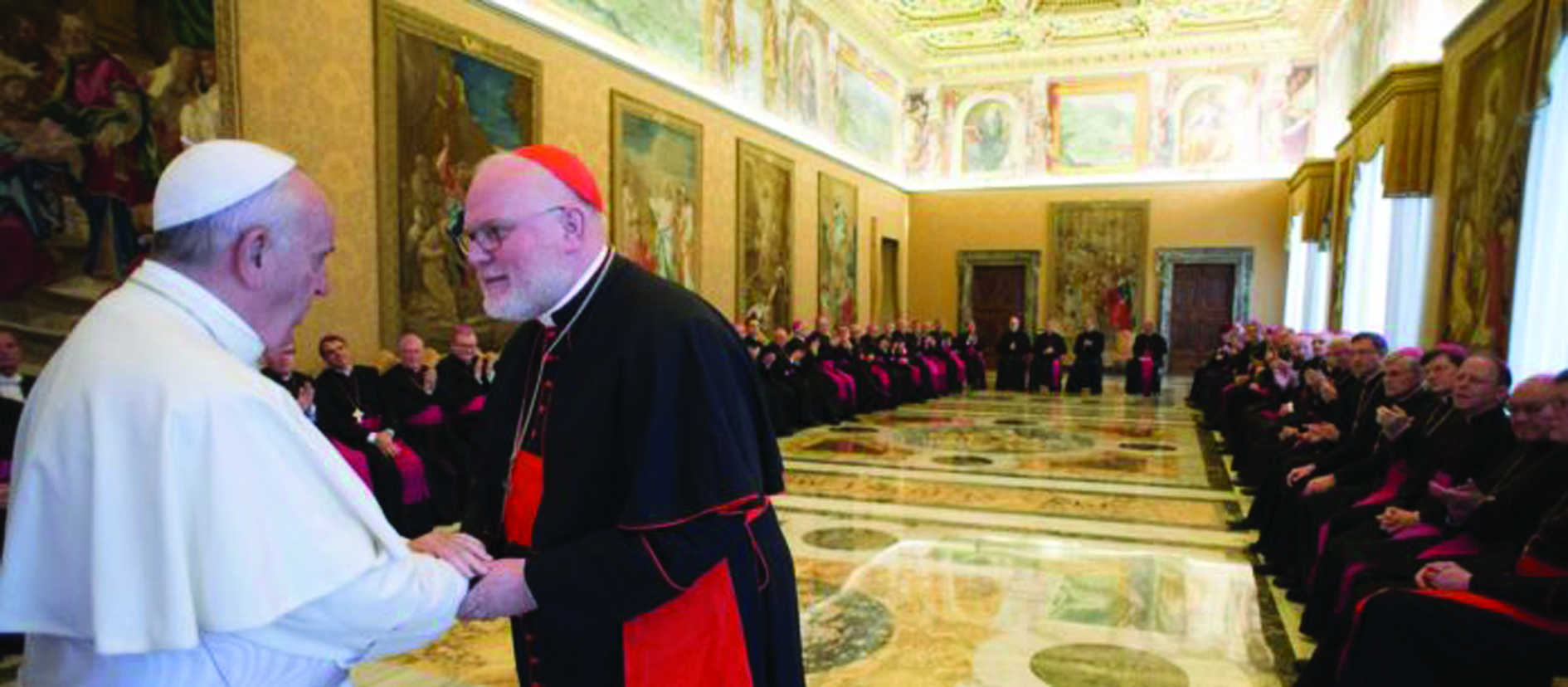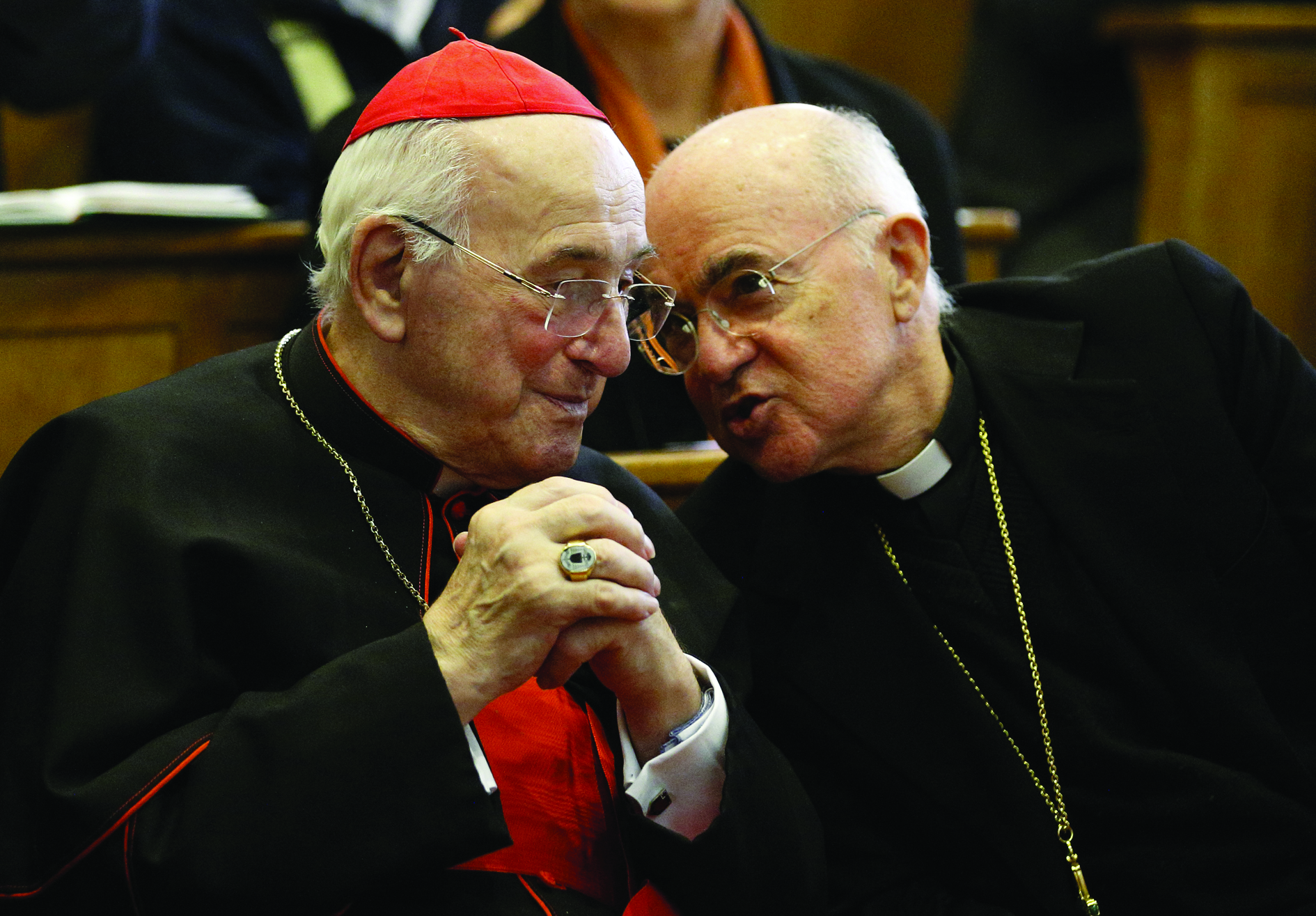
Pope Francis greets Cardinal Reinhard Marx, President of the German Bishops’ Conference, during the German bishops’ ad limita visit to Rome in 2018
Archbishop Carlo Maria Viganò Came Out of Seclusion to Join an International Group of Protesters at a Prayer Vigil in Munich

German Cardinal Walter Brandmüller talks to Archbishop Carlo Maria Viganò, former apostolic nuncio to the United States, during a Rome conference on St. Paul VI’s 1968 encyclical Humanae Vitae in 2017 (CNS/Paul Haring)
By ITV Staff
An international group of lay Catholics calling themselves Acies Ordinata (“Battle-line Array”) gathered in Munich, Germany, on January 20 to pray in “firm protest” that the German Episcopal Conference and its president, Cardinal Reinhard Marx, abandon its new “synodal process,” inaugurated during the first week of Advent, which the Church in Germany plans to pursue over two years, ending in resolutions which may change Catholic life, and even Catholic belief, say some, in Germany.
Among the crowd of about 100 was Archbishop Carlo Maria Viganò, the former nuncio to the U.S. and, more recently, an outspoken critic of the Vatican’s role in the now-disgraced Theodore McCarrick affair as well as the 2019 Amazon Synod, albeit from seclusion — until now. The archbishop did not speak at the gathering but simply stood silently among the faithful who prayed and sang in front of the Theatinerkirche at the center of Munich.
Those who did speak at a subsequent press conference at the Literaturhaus Munich were six Catholic lay people from Europe, South America and the U.S.: Michael J. Matt, editor of the conservative Catholic newspaper The Remnant; Alexander Tschugguel, now-famous remover of the pagan Pachamama statue from a Roman church;
Jeanne Smits, French Catholic journalist; José Antonio Ureta, Chilean author and founding member of the pro-family Fundación Roma; John-Henry Westen, editor of LifeSite News; and Roberto de Mattei, Italian historian and author.
The “agenda” of the German “synodal process,” as voted on and announced by Cardinal Marx last year, is to be: priestly celibacy, the Church’s teaching on sexual morality, the role of women, and a reduction of clerical power. An assembly of laypeople, larger in number than the German assembly of bishops, also voted on the statutes guiding the “synodal process.”
The decision of the German bishops to re-examine “hot-button” areas of Church teaching like sexuality has met with disapproval from many segments of the worldwide Church; even the Vatican’s head of the Congregation for Bishops, Cardinal Marc Ouellet, sent the bishops a letter September 4 in which he warned that their plan, as it stood, violated canonical norms and might result in actual attempts to change Catholic teaching which Rome could not approve.
The Vatican letter also said that the proposed make-up of the Synodal Assembly is “not ecclesiologically valid.” It cited the bishops’ proposed partnership with the Central Committee of German Catholics (ZdK), a lay group that has taken public stances against a range of Church teachings, including those on women’s ordination and sexual morality.
In response, the German bishops voted to change the status of the decisions resulting from the “synodal process” from “binding” to “non-binding.”
Only two German bishops have dissented from the direction in which their brother bishops are forging ahead: Bishop Rudolph Voderholzer of Regensburg and Cardinal Rainer Woelki of Cologne. They proposed in August an alternative synodal proposal focusing more on evangelization, in conformity with a letter sent by the Holy Father himself to German Catholics emphasizing spiritual formation and evangelization; the bishops’executive committee voted it down.
In his June letter, Pope Francis also warned the German bishops not to follow the zeitgeist of the times, and to avoid a “new Pelagianism” which might threaten the communion of the Church in Germany with Rome and the universal Church.
Archbishop Viganò released a statement in October of 2019 in which he quoted a 2006 homily by Pope Benedict XVI to members of the International Theological Commission: “Obedience to the truth must ‘purify’ our souls and thus guide us to upright speech and upright action. In other words, speaking in the hope of being applauded, governed by what people want to hear out of obedience to the dictatorship of current opinion, is considered to be a sort of prostitution: of words and of the soul.”
By the archbishop’s presence at the prayer vigil in Munich, he seems to point to the German bishops as ones who are bowing to the “dictatorship of current opinion,” rather than showing forth “obedience to the truth.”
In the following pages we excerpt the remarks given by the six speakers at the press conference following the prayer vigil.
Speech Excerpts
A Catastrophic Synodal Path by Michael J. Matt
“A Church that No Longer Preaches?” by Alexander Tschuggel
“Why We Do Not Accept the Revolutionizing of the Role of Women in the Church” by Jeanne Smits
The Five Pseudo-Synodal Impostures of the German “Path” by José Antonio Ureta
“You Have Blood on Your Hands” by John-Henry Westen
Appeal to German Catholics against the Kirchensteuer (“Church Tax”) by Roberto de Mattei






Facebook Comments